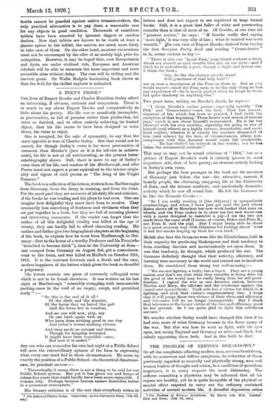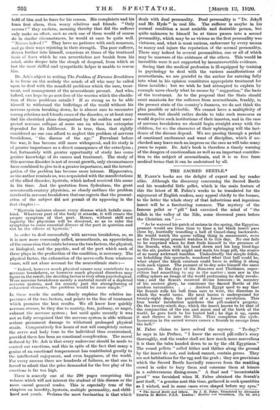THE PROBLEM OF NERVOUS BREAKDOWN.* Or all the complaints affecting
modern man, nervous breakdown, with its numerous and diffuse symptoms, its reduction of those previously regarded as mentally and physically strong, men and women leaders of thought and action, to a condition of querulous impotence, is in many respects the most distressing. The sufferer consulting a physician may be informed that all his organs are healthy, yet he is quite incapable of the physical or mental effort required to carry out the ordinary sustained activities of normal modern life. A dreadful depression seizes
• The Problem of Nervous Breakdown. By Edwin Ash. M.D. London Dills and Boon. [10s. 8d. net.] hold of him and he fears for his reason. His complaints and his fears first alarm, then weary relatives and friends. " Only nerves ! " they exclaim, meaning thereby that did the sufferer only make an effort, such as each one of them would of course do in similar circumstances, he would at once be quite well. " Nerves indeed ! " They have no patience with such nonsense, and go their ways rejoicing in their strength. Tha poor sufferer, driven further into himself, conscious at times of the irrational basis of fears which he can nevertheless not banish from his mind, sinks deeper into the slough of despond, from which at last the most skilful and sympathetic helper is unable to rescue him.
Dr. Ash's object in writing The Problem of Nervous Breakdown is to focus on the malady the minds of all who may be called upon to deal with the manifold problems which the care, treat- ment, and management of the neurasthenic present. And who, indeed, can hope to go scot-free of the worries which the elucida- tion of these problems entails ? If so strong as to be able himself to withstand the buffetings of the world without his nervous system breaking down, he is almost sure to encounter among relations and friends cases of the disorder, or at least may find his cherished plans disorganized by the sudden and unex- pected nervous collapse of some one on whom his enterprise depended for its fulfilment. It is true, then, that rightly considered no one can afford to neglect this problem of nervous breakdown, " the disease of the age." Prevalent before the war, it has become still more widespread, and its study is of greater importance as a direct consequence of the cataclysm ; but. fortunately with greater opportunity of study has come greater knowledge of its causes and treatment. The study of this nervous disorder is not of recent growth, only circumstances have combined to give to it a greater importance, and the investi- gation of the problem has become more intense. Hippocrates, as the author reminds us, was acquainted with the manifestations of the allied disorder, hysteria, which indeed received this name in his time. And the quotation from Sydenham, the great seventeenth-century physician, so clearly outlines the problem involved in nervous breakdown that one regrets that the present- ation of the subject did not permit of its appearing in the first chapter :— " Hysteria imitates almost every disease which befalls man- kind. Whatever part of the body it attacks, it will create the proper symptom of that part. Hence, without skill and sagacity the physician will be deceived, so as to refer the symptoms to some essential disease of the part in question and not to the effects of hysteria."
In order to deal successfully with nervous breakdown, or, as it is now more commonly called, neurasthenia, an appreciation of the connexion that exists between the two factors, the physical, or biological, and the psychic, and of the part which each of these plays in the production of the condition, is necessary. The physical factor, the exhaustion of the nerve-cells from whatever cause, will not alone account for the neurasthenic state :— " Indeed, however much physical causes may contribute to a nervous breakdown, or however much physical disorders may figure in the result, the deciding factor is very often psychological. Were nervous breakdown merely a material result of a depleted nervous system, and its remedy just the strengthening of exhausted elements, the problem would be more simple."
In these words the author clearly explains the relative im- portance of the two factors, and points to the line of treatment which promises the best results. We all know how quickly nervous storms, be they due to anxiety, fear, jealousy, or anger, exhaust the nervous system ; but until quite recently it was not so fully recognized that the nervous system is able without serious permanent damage to withstand prolonged physical strain. Comparatively few hours of rest will completely restore the nerve and body tone to the individual thus overstrained, provided there has been no emotional complication. The moral deduced by Dr. Ash is that every endeavour should be made to control our emotions, and this in spite of the fact that many a genius of an emotional temperament has contributed greatly to the intellectual enjoyment, and even happiness, of the world. For every success there are hundreds of failures, so that one is forced to admit that the price demanded for the free play of the emotions is far too high.
There is scarcely one of the 290 pages comprising this volume which will not interest the student of this disease or the more casual general reader. This is especially true of the chapters on heredity, hysteria, multiple personality, and child- hood and youth. Perhaps the most fascinating is that which deals with dual personality. Dual personality is " Dr. Jekyll and Mr. Hyde " in real life. The sufferer is maybe in his normal condition a most amiable and desirable person, but quite unknown to himself he at times passes into a second personality, which may be as vicious as the first personality was virtuous, and, what is most curious, endeavour by every means to annoy and injure the reputation of the normal personality. There may indeed be several personalities, one or all of which may be unaware of the existence of the others. This would be incredible were it not supported by incontrovertible evidence.
Seeing that the medical profession is ill-equipped by training in psychology to deal with the various manifestations of neurasthenia, we are grateful to the author for entering fully into what in his opinion constitutes appropriate treatment for these invalids ; but we wish he had attempted to explain by example more clearly what he means by " suggestion," the basis of the treatment. As to the proposal that the State should erect sanatoria for the sufferers from neurasthenia, frankly, in the present state of the country's finances, we do not think tho plan possible or advisable. We cannot have a multiplicity of sanatoria, but should rather decide to take such measures as would deprive such institutions of their inmates, and in the case of nervous breakdown we should begin straight away with the children, for on the character of their upbringing will the inci- dence of the disease depend. We are passing through a period of emotional excitement and want of discipline, which if un- checked may leave such an impress on the race as will take many years to repair. Dr. Ash's book is therefore a timely warning of the dangers of emotionalism as well as an important contribu- tion to the subject of neurasthenia, and it is so free from medical terms that it can be understood by all.











































 Previous page
Previous page